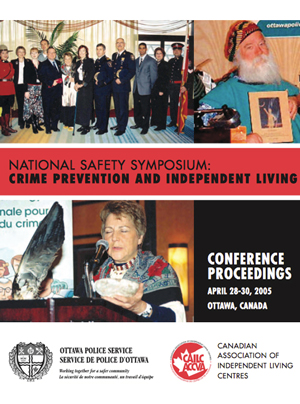Crime Prevention
Crime Prevention
ARCHIVE 2005: Crime Prevention and Independent Living
 Report Forward:
Report Forward:
In 2003 the Canadian Association of Independent Living Centres (CAILC) received funding from the National Crime Prevention Partnership Program, Public Safety and Emergency Preparedness Canada for “Crime Prevention and Independent Living; A Pan-Canadian Initiative for People with Disabilities”. CAILC is a non-profit, national bilingual umbrella organization supporting a network of 26 member Centres across Canada to promote the full participation and integration of persons with disabilities. Centres are run by and for persons with a wide variety of disabilities. To find out more about CAILC and the Independent Living philosophy that guides the programs and services delivered by member Centres, visit us on the web at www.cailc.ca or www.accva.ca.
CAILC believes that this crime prevention initiative meets a recognized and urgent need. As the federal government's National Crime Prevention Strategy has identified, people with disabilities face a disproportionate rate of crime due of limitations in mobility and dependence on others. In the words of Traci Walters, CAILC National Director: “Canadians with disabilities are twice as likely to be victims of violence - 67% of women with disabilities have been physically or sexually assaulted as children. Every year in Canada, 15,000 children suffer permanent or long term disabilities as a result of abuse or violence. These are just a few of many alarming facts regarding disabled persons that have been virtually left un-addressed.”
The overall goal of this project was to build the capacity of local disability organizations including the national network of CAILC member Independent Living Resource Centres (ILRCs), first time responders and local communities to work together and share information
on crime prevention programs and initiatives for people with disabilities.
Specifically, the project had three central objectives:
- To highlight the particular circumstances of crime and victimization towards people with disabilities in Canada through increased information sharing between and among law enforcement agencies, disability organizations, service providers, and people with disabilities;
- To develop information, resources and dialogue about crime prevention and disability;
- To develop and enhance networking and partnerships at the local and national levels between law enforcement agencies, front line workers, disability and community organizations, ILRCs and persons with disabilities.
To realize project objectives, a central component of this initiative was the development and delivery of the National Safety Symposium: Crime Prevention and Independent Living. For the symposium CAILC brought together consumers, police and first time responders, service providers, disability organizations, and government agencies from across Canada, to learn about our respective initiatives and to gain mutual understanding of our different experiences and points of view. It also afforded the opportunity to work together to develop recommendations for an inclusive national crime prevention strategy.
On behalf of CAILC and its network of member Centres, I take this opportunity to thank our partners the Ottawa Police Service, and funding sponsor the National Crime Prevention Partnership Program, Public Safety and Emergency Preparedness Canada whose financial and in-kind contributions made the symposium such a success.
The Crime Prevention project was completed in June 2005. However, CAILC remains committed to promoting positive relationships and partnerships between the disability community, first time responders, police services and government agencies to reduce the vulnerability of persons with disabilities to violence and abuse and to build safer communities for all.
 English
English Français
Français